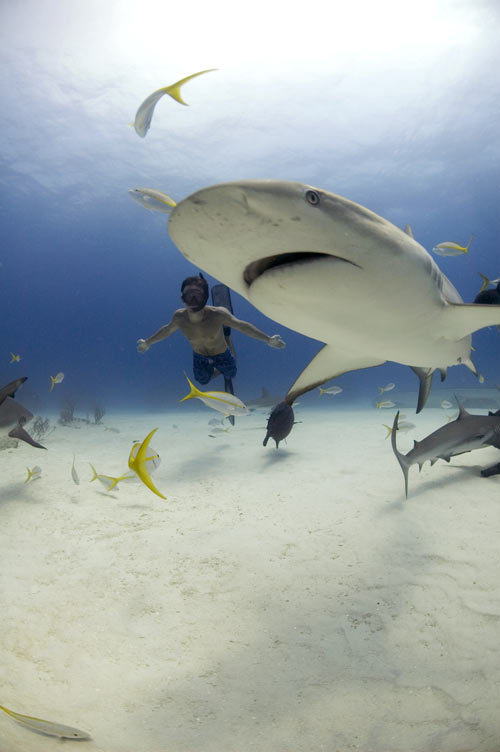Swimming with sharks (one man's unfashionable crusade)

Rob Stewart was filming in one of the world's most heavily protected marine reserves when he stumbled across the massacre that changed his life. Swimming off Ecuador's Galapagos Islands, which inspired Charles Darwin's theory of evolution, the young Canadian wildlife photographer came across a floating graveyard.
For 60km, at regular intervals, the contorted bodies of hundreds of sharks hung like ghosts in the sea. Ensnared by razor-sharp hooks attached to a strong plastic line tens of miles long, they had all fallen victim to a commercial fishing practice known as long-line fishing.
"Something shifted that day," Stewart recalls. "I thought, 'If this is what can happen in the most protected marine reserve on the planet, imagine what is happening to sharks all around the world.'"
Like many who have seen at first hand the devastation that man inflicts on nature, the film-maker, now 28, decided he could no longer remain an impartial observer. For the past five years, Stewart has embarked on a one-man crusade to save the shark – the culmination of which is his award-winning debut film, Sharkwater, which opens in the UK later this month. Shot in high-definition, it has been hailed by critics as an oceanic version of Al Gore's An Inconvenient Truth.
The American trailer for 'Sharkwater'. Contains scenes of a graphic nature
© 2007 Sharkwater Productions Inc.
Unlike whales, which are protected by an international moratorium on hunting only recently broken by Japan, sharks have few high-powered friends and one of the most maligned reputations in the animal kingdom. Getting the world to start caring, Stewart believes, is the only way to save one of the world's greatest predators. "Sharks kill on average five people a year and yet they are loathed," he says. "Elephants kill at least 100 people but when a single elephant falls in Africa the world goes crazy. There was a time when, like the shark, the whale was thought of as a terrible man-eating monster – just look at Moby-Dick. But slowly people's perceptions changed. That's what needs to happen for sharks."
Protecting sharks is a risky business. In making Sharkwater, Stewart confronted the multi-billion pound shark-finning industry and uncovered a world of corruption, espionage and organised crime syndicates.
Six years ago Stewart joined the radical Sea Shepherd conservation group to help the Costa Rican government stop the long-line fishermen who were hunting inside the country's marine reserves. Led by fellow Canadian Paul Watson (who has been battling the Japanese whaling fleet in the Antarctic this winter) Sea Shepherd has earned itself a reputation for being one of the most aggressive and uncompromising conservation groups, unafraid to ram or scupper illegal fishing vessels.
But instead of filming sharks, Stewart found himself immediately pitched into a battle with an illegal Guatemalan fishing vessel. Despite being invited by the Costa Rican government to do precisely what they were doing, by the time Sea Shepherd made it to the mainland the police were waiting for them and arrested the crew for seven counts of attempted murder. Skipping house arrest, Stewart donned an undercover camera and found out why their host government had turned against them. In the private docks of a nearby town he secretly filmed what he describes as an international Taiwanese crime ring that still controls the global shark-fin trade.
Convinced that they would be unable to receive a fair trial in a country so involved in the trade, Sea Shepherd made a break for the Galapagos Islands and managed to outrun the heavily armed coastguards that desperately tried to turn them back.
"The days of letter-writing and petitioning are over," Stewart says. "If we were overfishing our seas by 10 per cent then maybe I would be critical of someone like Paul Watson, but right now we are overfishing by somewhere in the region of 1,000 per cent."
Beyond gun-toting excitement of eco-vigilantism, there is a serious message to Stewart's film: the extinction of the one of the world's top predators could have catastrophic consequences for the ecosystem of all the oceans.
"Life on land was only possible thanks to life starting in our seas and I believe the most important issue facing humanity right now is the conservation of our oceans," Stewart says.
As an example of how fragile oceanic ecosystems can be, Stewart explains what happened when sea otters were hunted for their fur to near extinction off the North American west coast.
"The obliteration of sea otters led to an explosion in sea urchins, which then ate all the kelp," he explains. "Kelp was the perfect breeding ground for Pacific herring, so their population also plummeted. With no herring to feed on, sharks, tuna and dolphins began to disappear. If that is what happens when you take a seven-million-year-old species out of the food chain, imagine what will happen when you destroy a 450-million-year-old predator like the shark."
Despite the world's current unwillingness to reverse the shark population's steep decline, Stewart remains confident that in the end governments will realises their mistake. "I think that, like the ban on elephant ivory and hunting whales, we will eventually see a worldwide ban on shark-finning. The question is whether that will happen in time."
Join our commenting forum
Join thought-provoking conversations, follow other Independent readers and see their replies
Comments
Bookmark popover
Removed from bookmarks